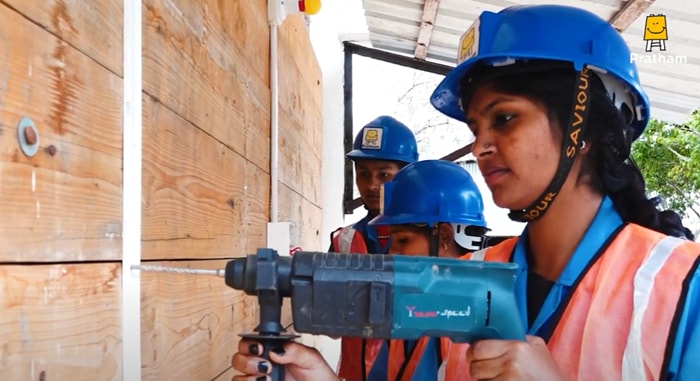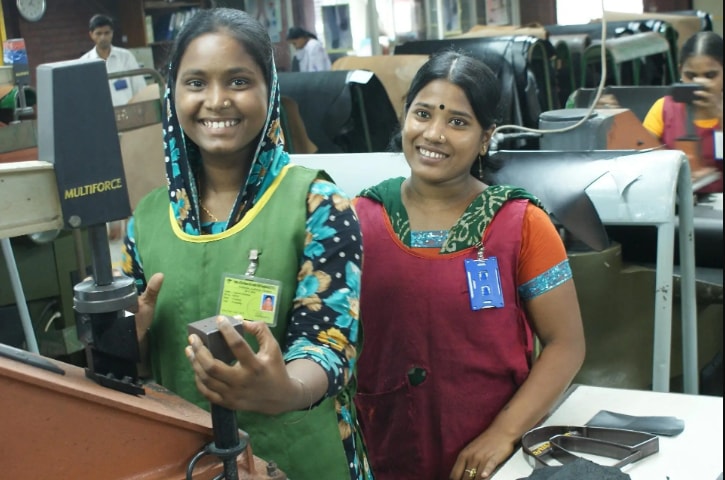| Aspirational India is beckoning a new generation of young women who want skills that go beyond papad and pickle making, tailoring and embroidery, beauty and healthcare. What’s holding them back? Read on… The big story Brave new world: Skilling women for modern India  | New frontiers | Priyanka Parashar/Mint | When Shashi Bala, the daughter of a farmer in Himachal Pradesh’s Garli village in Kangra district, saw an ad on Facebook for a drone programme, free for women at IIT Mandi, she assumed it was fake. So she cross-checked on another website, found it was correct and promptly signed up. Designed to train women to use drones for agriculture—spraying pesticide and fertiliser, for instance—the two-and-a-half-month Drone Didi programme equips women like Shashi Bala with the skills to operate and maintain drones. Not every girl who signed up for the course ended up in agriculture. Mrinalini Marh, the daughter of teachers in Chamba district, had long wanted to make films. After she completed the programme, she says she looked for a suitable job but couldn’t find any—some wanted engineering skills, others were based in South India where language would have been a problem. Finally, an opportunity opened up in Jaipur with a drone tech company that takes videos of tourists at places like Amer Fort. She starts work on August 1. Aspirational India is beckoning. And this generation of young women is determined not to be left behind. For too long they have watched their mothers and grandmothers go through the more typical skilling route of pickle and papad making; tailoring and embroidery; beauty and healthcare. Policy makers and government are waking up to this new aspirational India. Presenting the Budget, Finance Minister Nirmala Sitharaman announced the allocation of Rs 500 crore for the Namo Drone Didi scheme, an initiative aimed at providing drones to 15,000 selected women self-help groups. The village of women electricians  Pratham Skilling The opening up of sectors that were earlier not available to anyone, male or female, is without a doubt firing a countless dreams. Solar energy, green jobs, AI all demand new skills and are, as a consequence, opening up new lines for women. “There is a huge number of women waiting and wanting to do things that will make them employable,” says Pritha Dutt, the founder of MeraBizNet that supports women-owned businesses. But these aspirations require enabling factors to first be realised. Mentorship, for instance, is crucial. There is also the lack of finance to set up women-led enterprises. “In the absence of formal jobs, entrepreneurship is one avenue that a lot of women aspire to, especially women from low and middle income backgrounds,” says Dutt. But, often the biggest stumbling block is “helping women believe in themselves against all socio-cultural norms.” Very often the first obstacle are the parents, hampered by social-cultural norms of what is considered an appropriate skill, or work for daughters. Pratham Skilling , the non-profit skilling division of Pratham Foundation, has been “trying to push the envelope in more non-traditional skills for women” says Annette Francis, co-head, skilling, entrepreneurships and livelihoods, Pratham Skilling. The challenge, she says, is to get the first few to enrol in fields such as welding, automotive or plumbing. “It just doesn’t happen very organically. You need to make harder efforts to get the first few women, either by recruiting female trainers or mobilisers. Once you have the first five or 10 women, then it becomes easier.” Vadgaon, a village near Aurangabad, for instance, is now known as a village of women electricians. In began in 2015 when Pratham took the decision to actively bring in more women into the non-traditional trades it taught across its training institutes across India. In 2021 when it began an electrical training centre, it was a challenge to get women to join. Mobilisers and recruiters had to meet with parents multiple times to convince them that sending their daughters to train for two months at a residential facility to become electricians was not the end of the world. But the parents worried. How would the girls live away from their families while they trained? And who had ever heard of women electricians anyway? The resistance was so stiff that finally, the parents were bused in to the training centre to see for themselves, the living arrangements, the classrooms, the dining facility. Convinced, the first batch of girls tentatively arrived in 2021. When they went back home, they began working for salaries starting at Rs 15,000 a month, far more than the average of Rs 8,000 that their parents were earning at the nearby factories. Within a year there was a “burst of women trainees”, says Francis. Watching these financially independent women go off to work and support their families inspired other women in the village to enrol in the course. And, the legend of how Vadgaon became a hub for women electricians has only grown. [Watch Pratham’s short film on Vadgaon here.] Reversing the slide?  Breaking barriers / IWWAGE For years now, India’s female labour force participation has been cause for concern. At 37%, according to the Periodic Labour Force Survey for 2022-23, there is a 40 percentage point lag behind workforce participation at 78.5% for men. There are many reasons why women stay out of the workforce. These include the disproportionate burden of housework that leaves them with very little time for paid work outside the house; social norms on ‘appropriate’ work for women; safety and mobility issues; the lack of infrastructure such as creches and hostels. In the emerging workforce, the absence of requisite vocational skills is a relatively new factor, writes economist Farzana Afridi in IndiaSpend. There is no shortage of skilling initiatives for women, from 15,000 Industrial Training Institutes that reserve 30% of seats for women to national skill institutes that cater solely to women. Yet, a survey by the Digital Platforms and Women’s Economic Empowerment project found that three in five women in Delhi and Bengaluru said they lacked the skills to get a steady, well-paying job. Over half felt they didn’t have the skills for an interview. But getting women to enrol isn’t easy. At IIT Mandi, for instance, the Drone Didi programme is free for women, including boarding and lodging. Many are “not aware of the benefits of these short-term skilling programmes and there is reluctance from the girls and their parents in some cases,” says Nidhi Sehgal, skill development coordinator, in an email reply. “Some of them also think courses like solar or kisan drone operator are more suitable for male rather than for females.” And, there are “parents who don’t want to send their girls out of the state for education/employment because of old traditional barriers.” Not surprising then that there is a “considerable gender gap in the domain of vocational training”, says Afridi. In 2022-23, 36.1% of men and only 18.6% of women between the ages of 18 and 59 had received vocational training. When women do opt for skill acquisition, they tend to gravitate towards the more traditional areas of beauty, tailoring and healthcare while men opt for electronics, mechanical and civil engineering and the automotive industry where earnings are higher, says Afridi. But, “skill development can be a transforming force, boosting women’s professional trajectories and economic independence,” she says. There is of course a virtuous cycle, as seen in Vadgaon. As women pick up skills that match their own aspirations, they become role models for a whole generation of girls watching them. After completing the drone programme, Shashi Bala landed a job in Patna with a private company that pays her Rs 18,000 a month. She’s living in a women’s hostel, the first girl in her village to leave home and go out for a job. “The other girls in my village are curious and want to know what flying a drone is all about,” she tells me. Easy to predict that this village will be seeing more drone pilots. |